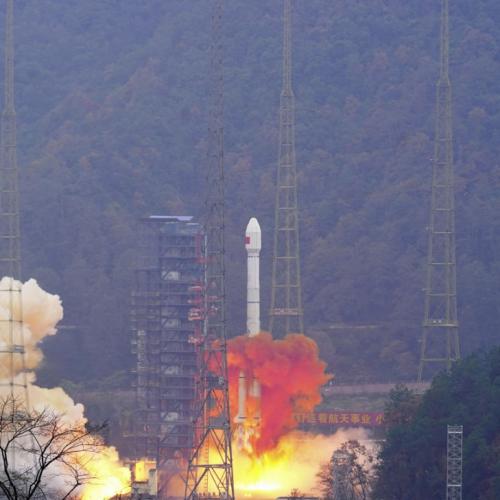



NANNING - As heavy rain clouds gather over Shangtang village in Wuxuan county, Guangxi Zhuang autonomous region, drovers eye their buffalo herds in the distance and hasten their pace, while unmanned tractors maintain their steady advance across the sugarcane fields.
During this spring plowing season, farmers sitting behind the driverless sugarcane tractors, guided by the BeiDou Navigation Satellite System (BDS), drop sugarcane seeds at regular intervals. With the help of the automated tractors, the process of planting, fertilizing, and mulching can be completed in one go.
Modern agricultural technology and mechanization were a real game changer for Wuxuan County, one of China's major sugarcane planting areas. Today, the seeding of sugarcane is ten times more efficient than before.
Tractors now follow a pre-designed route planned by the BDS.
"With the help of BDS, we can control the deviation of the straight lines within two centimeters, as well as control the distance within five centimeters between each line, which can benefit photosynthesis and the absorption of nutrients and oxygen in sugarcane," said Wu Qihui, director of Wuxuan Bosheng Agricultural Machinery Specialized Cooperative. "Also, the favorable ventilation is crucial to achieve high yield."
Having been planting this common cash crop in southern China for more than 10 years, local farmer Lu Ruwen joined the cooperative in 2020, which hires out agricultural machinery and equipment.
"It used to take a week to plant by hand my 20 mu (about 1.33 hectares) of farmland, but now just one day to finish all the work," he said. The whole process of sugarcane planting can be mechanized with all the of tools available in the cooperative, which help reduce at least 100 yuan ($14) per mu, according to him.
In addition to the efficient equipment, quality sugarcane seeds are also crucial to boosting yields.
In the cooperative's breeding base, rows of tall, bushy sugarcane ready for harvest are the early-maturing, high-sugar variety introduced from the regional academy of sciences.
"Later they will be cut into 20-centimeter-long stalks and then disinfected in our processing workshop," said Wu, adding that their standardized sugarcane seeds are popular because of their higher yield, which can produce eight tonnes per mu.
With better policy support for agricultural production, local villagers are more and more willing to participate in the development of modern agriculture.
"The government also has corresponding subsidies for those who adopt mechanized farming methods or disinfected and healthy sugarcane varieties," explained Mo Tingjin, director of the Agricultural Mechanization Service Center of Laibin. "Many farmers can even plant sugarcane at zero cost with these subsidies."
If you have any problems with this article, please contact us at app@chinadaily.com.cn and we'll immediately get back to you.